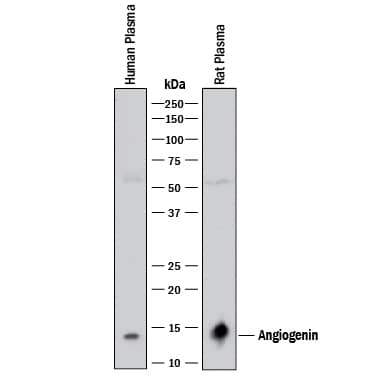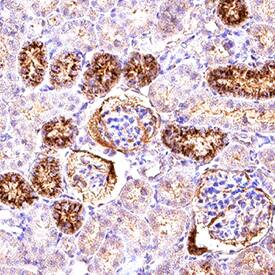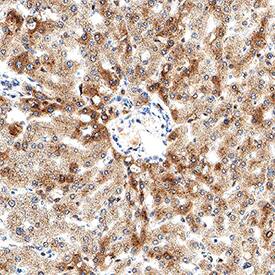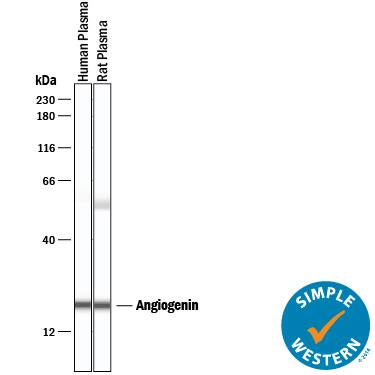Human/Rat Angiogenin Antibody
R&D Systems, part of Bio-Techne | Catalog # AF265


Key Product Details
Species Reactivity
Validated:
Cited:
Applications
Validated:
Cited:
Label
Antibody Source
Product Specifications
Immunogen
Gln25-Pro147
Accession # Q53X86
Specificity
Clonality
Host
Isotype
Scientific Data Images for Human/Rat Angiogenin Antibody
Detection of Human and Rat Angiogenin by Western Blot.
Western blot shows human plasma and rat plasma. PVDF membrane was probed with 0.5 µg/mL of Goat Anti-Human/Rat Angiogenin Antigen Affinity-purified Polyclonal Antibody (Catalog # AF265) followed by HRP-conjugated Anti-Goat IgG Secondary Antibody (Catalog # HAF017). A specific band was detected for Angiogenin at approximately 14 kDa (as indicated). This experiment was conducted under reducing conditions and using Immunoblot Buffer Group 1.Angiogenin in Rat Kidney.
Angiogenin was detected in immersion fixed paraffin-embedded sections of rat kidney using Goat Anti-Human/Rat Angiogenin Antigen Affinity-purified Polyclonal Antibody (Catalog # AF265) at 1 µg/mL for 1 hour at room temperature followed by incubation with the Anti-Goat IgG VisUCyte™ HRP Polymer Antibody (VC004). Before incubation with the primary antibody, tissue was subjected to heat-induced epitope retrieval using Antigen Retrieval Reagent-Basic (CTS013). Tissue was stained using DAB (brown) and counterstained with hematoxylin (blue). Specific staining was localized to convoluted tubules. Staining was performed using our protocol for IHC Staining with VisUCyte HRP Polymer Detection Reagents.Angiogenin in Human Liver.
Angiogenin was detected in immersion fixed paraffin-embedded sections of human liver using Goat Anti-Human/Rat Angiogenin Antigen Affinity-purified Polyclonal Antibody (Catalog # AF265) at 1 µg/mL for 1 hour at room temperature followed by incubation with the Anti-Goat IgG VisUCyte™ HRP Polymer Antibody (VC004). Before incubation with the primary antibody, tissue was subjected to heat-induced epitope retrieval using Antigen Retrieval Reagent-Basic (CTS013). Tissue was stained using DAB (brown) and counterstained with hematoxylin (blue). Specific staining was localized to hepatocytes. Staining was performed using our protocol for IHC Staining with VisUCyte HRP Polymer Detection Reagents.Applications for Human/Rat Angiogenin Antibody
Immunohistochemistry
Sample: Immersion fixed paraffin-embedded sections of rat kidney and human liver
Simple Western
Sample: Human plasma and rat plasma
Western Blot
Sample: Human plasma and rat plasma
Reviewed Applications
Read 1 review rated 5 using AF265 in the following applications:
Formulation, Preparation, and Storage
Purification
Reconstitution
Formulation
Shipping
Stability & Storage
- 12 months from date of receipt, -20 to -70 °C as supplied.
- 1 month, 2 to 8 °C under sterile conditions after reconstitution.
- 6 months, -20 to -70 °C under sterile conditions after reconstitution.
Background: Angiogenin
Angiogenin was initially purified from serum-free media conditioned by growth of a human adenocarcinoma cell line HT-29 based on its ability to initiate vascularization in the chicken embryo chorioallantoic membrane. A number of other tumor, as well as normal, cell lines can also secrete Angiogenin. In addition, Angiogenin is present in normal human plasma at levels as high as 60‑120 ng/mL. Unlike other angiogenic factors such as FGF, Angiogenin is neither mitogenic nor chemotactic for vascular endothelial cells in vitro. However, Angiogenin can stimulate capillary and umbilical vein endothelial cells to produce diacylglycerol and secrete prostacyclin by phospholipase activation. Angiogenin, absorbed on plastic, can also support endothelial and fibroblast cell adhesion and spreading.
Surprisingly, Angiogenin has been found to be a member of the ribonuclease superfamily with approximately 35% sequence similarity at the amino acid level with pancreatic RNase. Angiogenin exhibits ribonucleolytic activity that is distinctly different than that of pancreatic RNase A. The ribonucleolytic activity of Angiogenin toward most RNase A substrates is much lower than that of RNase A. Nevertheless, the ribonucleolytic activity of Angiogenin is essential to its angiogenic activity since inhibition of the Angiogenin RNase activity will also abolish angiogenesis activity. Similar to several members of the RNase superfamily, Angiogenin is a cytotoxic agent that can abolish cellular protein synthesis. It has been demonstrated that Angiogenin-dependent protein synthesis inhibition can be attributed to the function of Angiogenin as a cytotoxic tRNA-specific RNAase.
A cell-surface Angiogenin binding protein has been purified and characterized. Tryptic peptide mapping and sequence analysis indicate that this binding protein is a member of the actin family.
Additional Angiogenin Products
Product Documents for Human/Rat Angiogenin Antibody
Product Specific Notices for Human/Rat Angiogenin Antibody
For research use only


